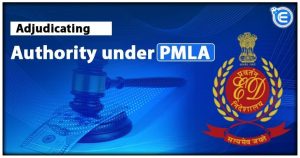ForumIAS announcing GS Foundation Program for UPSC CSE 2025-26 from 19 April. Click Here for more information.
Source-This post on Adjudicating authority under PMLA has been created based on the article “What is the ‘Adjudicating Authority’ that has confirmed ED’s attachment of Rahul-Sonia-promoted company’s assets?” published in “The Indian Express” on 13 April 2024.
Why in the news?
The Adjudicating Authority under the PMLA recently confirmed that it has attached assets worth Rs 751.9 crore belonging to the National Herald newspaper.
About Adjudicating authority under PMLA

Mandate-Under the Prevention of Money Laundering Act (PMLA), adjudicating authority has to determine whether the properties seized by the Enforcement Directorate (ED) are linked to money laundering or not, within 180 days.
Role of the Adjudicating authority
1) Section 5 of the PMLA allows the seizure of any property that is suspected to be acquired by the proceeds of crime in a case of any offence that is listed in the schedule of the law.
2) The attachment order is issued when the ED Director suspects that the proceeds of crime may be concealed, moved, or used in a way that could disrupt confiscation proceedings.
2) Provisional attachment order– It is valid for a period of 180 days, within which the Adjudicating Authority must confirm the attachment. If within this time, the attachment is not confirmed, then the property is automatically released from attachment.
3) The accused can continue to use the property until the adjudicating authority approves the seizure. After, adjudicating authority’s approval, ED will take control of it.
What happens after the Adjudicating Authority confirms the attachment?
1) Right to appeal-The accused has the right to challenge the adjudicating authority’s confirmation order at the PMLA’s Appellate Tribunal within 45 days.
2)Appellate tribunal– If the Appellate Tribunal also confirms the order, the accused can file a plea in the High Court, and so on.
3) Status of property-Unless the property is released, the owner won’t have access to it as long as trial is not over.
4) Final confirmation– Once the confirmation is final, if it’s a residential property, the ED will ask the owner to leave with their belongings, and the ED will take over possession.
5) In case of conviction– If there’s a conviction, the trial court may order confiscation of the attached property and transfer ownership to the central government.
Read more-Enforcement Directorate: Significance and Criticisms
UPSC Syllabus-Bills and Acts




